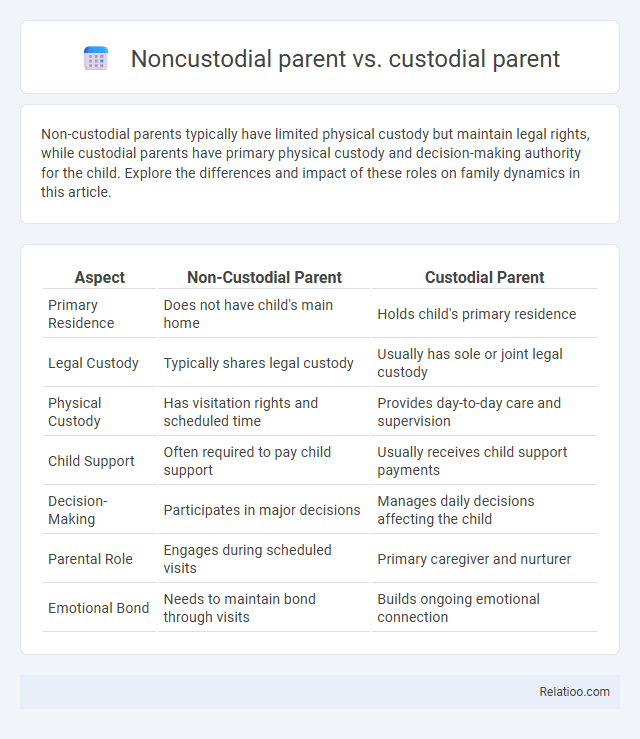Non-custodial parents typically have limited physical custody but maintain legal rights, while custodial parents have primary physical custody and decision-making authority for the child. Explore the differences and impact of these roles on family dynamics in this article.
Table of Comparison
| Aspect | Non-Custodial Parent | Custodial Parent |
|---|---|---|
| Primary Residence | Does not have child's main home | Holds child's primary residence |
| Legal Custody | Typically shares legal custody | Usually has sole or joint legal custody |
| Physical Custody | Has visitation rights and scheduled time | Provides day-to-day care and supervision |
| Child Support | Often required to pay child support | Usually receives child support payments |
| Decision-Making | Participates in major decisions | Manages daily decisions affecting the child |
| Parental Role | Engages during scheduled visits | Primary caregiver and nurturer |
| Emotional Bond | Needs to maintain bond through visits | Builds ongoing emotional connection |
Definition of Custodial and Non-Custodial Parents
Custodial parents are those who have the legal right and responsibility to care for and make decisions about their child's daily life and welfare. Non-custodial parents typically have visitation rights and may share in decision-making but do not live with the child or hold primary caregiving responsibilities. Understanding the distinction between your role as a custodial or non-custodial parent is crucial for managing custody arrangements and parental responsibilities effectively.
Legal Rights and Responsibilities
Custodial parents have primary legal rights and responsibilities including decision-making authority for the child's education, healthcare, and daily welfare, while non-custodial parents typically have visitation rights and may share some responsibilities such as child support payments. Non-custodial parents retain the right to maintain a relationship and access important information about the child, but their legal authority is more limited compared to custodial parents. Your rights as a non-custodial or custodial parent are defined by the family court order, which outlines the scope of decision-making, custody arrangements, and financial obligations.
Child Custody Arrangements Explained
Child custody arrangements define the legal and physical responsibilities between custodial and non-custodial parents, focusing on the child's best interests. The custodial parent typically has primary physical custody and decision-making rights, while the non-custodial parent often holds visitation rights and may contribute financially through child support. Your understanding of these roles ensures clarity in legal obligations and promotes a stable environment for the child's upbringing.
Impact on Child Support Obligations
Custodial parents are typically entitled to receive child support payments to cover the child's living expenses, education, and healthcare costs, while non-custodial parents are legally obligated to provide these financial contributions. The amount of child support is often determined by state guidelines, considering factors such as the income of the non-custodial parent and the needs of the child. Shared custody arrangements may alter support obligations, sometimes reducing payments if both parents contribute directly to the child's upbringing.
Visitation and Parenting Time Schedules
Custodial parents primarily hold physical custody, determining the child's main residence, while non-custodial parents have visitation rights and scheduled parenting time. Visitation and parenting time schedules are often established through court orders or mutual agreements, balancing the child's best interests and parental involvement. Non-custodial parents typically receive specific visitation periods, including weekends, holidays, and summer breaks, ensuring regular contact despite not living with the child full-time.
Communication Between Parents
Effective communication between non-custodial and custodial parents directly impacts the well-being of the child and the success of co-parenting arrangements. Your ability to maintain open, respectful dialogue facilitates coordination on child-related decisions, visitation schedules, and emotional support, reducing conflicts and misunderstandings. Emphasizing consistent communication channels, such as scheduled meetings or digital tools, fosters cooperation and stability for the child's development.
Modifying Custody and Support Orders
Modifying custody and support orders requires a non-custodial parent to file a formal petition demonstrating a substantial change in circumstances, which can affect visitation rights and child support obligations. Custodial parents seeking modifications must provide evidence that current arrangements no longer serve the child's best interest, potentially adjusting custody or increasing support payments. Your ability to modify these orders depends on legal standards set by the court, emphasizing the child's welfare and any financial or relational changes since the original order.
Emotional Effects on Children
Children with a custodial parent often experience a stronger sense of stability, while those with a non-custodial parent may face challenges like feelings of abandonment or divided loyalty. Your active involvement as a non-custodial parent positively influences emotional security and reduces anxiety in children. Consistent communication and quality time with both custodial and non-custodial parents are crucial for healthy emotional development and resilience.
Co-Parenting Strategies for Success
Effective co-parenting strategies for success involve clear communication, consistent routines, and mutual respect between custodial and non-custodial parents. You can enhance your child's well-being by establishing a shared parenting plan that prioritizes the child's needs and fosters collaboration despite differing parenting roles. Utilizing tools like parenting apps and mediation services helps maintain transparency and reduces conflict, ensuring a stable environment for the child.
Frequently Asked Questions about Custody Roles
Custodial parents are primarily responsible for the day-to-day care and decision-making for the child, while non-custodial parents typically have visitation rights and limited decision-making authority. Frequently asked questions about custody roles often involve the extent of visitation, child support obligations, and how custody affects parental involvement. Understanding your rights as either a custodial or non-custodial parent can help ensure proper communication and compliance with court-ordered custody arrangements.

Infographic: Non-custodial parent vs Custodial parent
 relatioo.com
relatioo.com